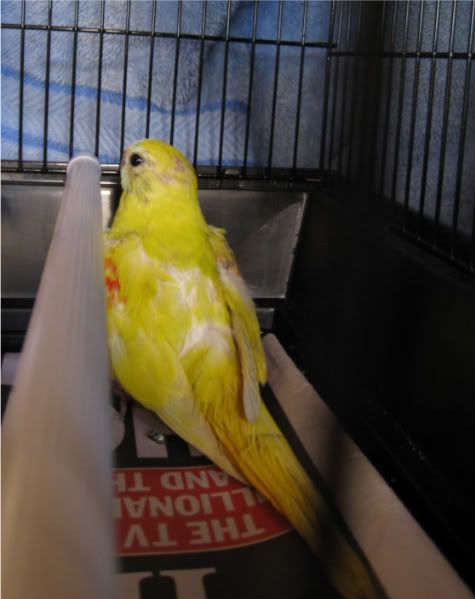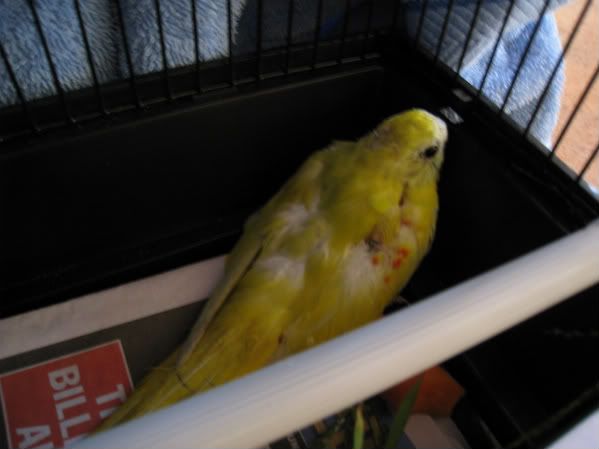|
|
Post by kirty on Jun 23, 2009 20:46:01 GMT 10
Hi all! I have recently found myself with a beautiful young Turq parrot. I have no idea about birds, but couldn't leave this guy where he was. As you can see from the photos, he is in a very poor way and the vet said if I hadn't taken him, he would have died within days. He has a severe bacterial infection - the worst parts are under his wings. He spent three days at the vets, but is now home and doing well. He has to have antibiotics twice a day for 10 days and thankfully he is very good with his medicine.  My local bird vet is BRILLIANT and has been helping me so much, but I have so many questions! I have an aviary (was meant to be a cat enclosure - sorry cats! LOL!) so once he is better he can go out there. He has to stay inside until it warms up though.  I have been told he needs a mate but I am not that keen on breeding. Is it possible to keep them by themselves? Can they be tamed at all? I will do whatever is best for him, but have no idea about these things! He is eating very well. He has small parrot seed, fresh grass seeds from my garden and also some veggies. I also bought some of those 'millet sprays' - are they OK for him? Any other tips/suggestions would be greatly appreciated. Also, if I get another Turq, where do I get it? The vet said he is about 6-10 months old so should I try and get a similar aged bird?   |
|
|
|
Post by norwichfinchman on Jun 23, 2009 21:01:49 GMT 10
My mate down the road from me keeps, Turks, Splendids, Linonated and Bourkes and they are lovely to look at. I don't think you have much of a chance at taming him or her?
You didn't mention have and where you obtained him from because your questions will be easyier to answer with knowing the history. If you found a mate for your Turquoise you will have no chance of taming them. But kept as a single bird and the bird knowingly reconise you a caring friend who has helped him recover you have a chance of having a semi tamed bird. It will most probably take food from your hand and will likely land on your shoulder from time to time but that is as good as it really gets. If your bird had been hand fed as a chick then you will have a better chance of taming him.
If your bird was a wild caught bird then he will need a mate and in my experience will be very hard to tame.
The only Parakeets I keep now are Kakariki's and they were parent reared but are somewhat tame as they will take fruit and vegtables and especially dandelions from my hand. They will never land or climb on me but are very happy in their flight. The hen is sitting on one egg at the moment so the cock bird sits by the avairy wire waiting to see what I will bring him?
|
|
|
|
Post by wompoodove on Jun 24, 2009 12:31:57 GMT 10
Hi Kirty:
Having watched Turq's in the wild over a period of a couple of days it seems that they are in constant contact with flock members so based on this limited knowledge I would suggest that he would do much better once he is completely well and full of vigor with another species. Perhaps someone can advise but I am thinking perhaps since you really dont need unwanted youngsters that you obtain another species entirely as a pal. I am thinking maybe a bourke's parrot companion for him or something like that. I have lots of experience with some aviary aussie birds but not this species so perhaps experienced Turk owners can fill you in.
Cheers!
Don
|
|
|
|
Post by Laraine on Jun 24, 2009 14:37:53 GMT 10
I have 6 turk parrots, they are cute little birds, but I would not like to keep one by itself. You could get another neophema (bourke, elegant, scarlett chested (I think this one would be the best as both breeds are rather timid birds). I have a pair of scarletts and a pair of turks in together in a small cage and they get on well. I don't know about taming, I have not heard of a tame turk. Give him fruit and vegetables as well as seed.
|
|
|
|
Post by wompoodove on Jun 24, 2009 15:56:30 GMT 10
Great Advise Loraine and I just wanted to mention this to Kirty:
I was really struck by your conscientious heart towards your new bird and especially impressed with all of the vet advise you have obtained. Its so fantastic to learn of someone like you who is so thoughtful and responsible with birds. People like you shine in aviculture.
Cheers mate!
Don
|
|
|
|
Post by sypher on Jun 24, 2009 18:14:00 GMT 10
where are you located Kirsten?
Shaun
|
|
|
|
Post by madaussie on Jun 24, 2009 18:23:14 GMT 10
Good on you lucky bird to have you in his life now .
j
|
|
|
|
Post by kirty on Jun 24, 2009 22:35:32 GMT 10
Thank you all for your advice. I am a sucker for animals (I rescue and rehome cats) so I couldn't just leave him where he was. OK so he has now cost me around $170 in vet bills, but what choice did I have!  Dodge (that's his name) is doing really well! Much more active now which is great. I feel sorry for him because he is only in a tiny cage, but the vet said he should stay in there until he is better. Poor boy.  I have been giving him small parrot seed, fresh grass seeds, millet sprays, carrot and today tried some snow pea! LOL! Will keep experimenting to find what he likes.  So if I got a scarlet-chested parrot, would I get a girl or boy? Or would it not matter? Oh and I am in Melbourne.  |
|
|
|
Post by damo223 on Jun 24, 2009 22:45:14 GMT 10
Hi Kirsten and Welcome
That was a very good thing that you have done. i am from Melbourne aswel the Western Suburbs Pointcook. Thats alright what you are feeding him, when you give him fruit and veg make sure you cut them in to fine pieces, my scarlets love pear, apple, silverbeat, bok choy and thistle.
i would go for another turk as scarlets are known to breed with scarlets and breed hybrids.
Damo
|
|
|
|
Post by kirty on Jun 24, 2009 23:11:42 GMT 10
Hmmm OK, no I don't want hybrids! If I do get a female Turq, how many babies am I likely to get? I think I read somewhere that they can have up to three clutches a year!! I have my hands full already, don't think I can handle that many baby birds! And what do you do with them? How do you find new homes for them?
|
|
|
|
Post by damo223 on Jun 24, 2009 23:49:27 GMT 10
yeh they can have 3 clutches a year and have about 3-5 in a clutch, you can get a female turk but it does not mean they will breed. If you dont want to breed them you dont put a nest box in for them, they are also preety easy birds to get rid of if you ever want to breed them, the local pet shop might buy them, or you can advertise them on here.  Damo |
|
|
|
Post by wompoodove on Jun 25, 2009 3:05:19 GMT 10
Kirty:
I am thinking perhaps a great looking Bourke's parrot pal for him and since they are quite far removed genetically unlikely to breed. Bourkies have such quiet personalities and beautiful subtle colors.
Cheers!
Don
|
|
|
|
Post by angelicvampyre on Jun 25, 2009 10:39:18 GMT 10
Hi and welcome and congrats on your new addition.
I don't know much about them so throwing this question out to those who do know more, if he is a male why not just get another male? Or are they not like Budgies where you can have two males who will get along and then you don't have to worry about eggs or babies.
|
|
|
|
Post by Laraine on Jun 25, 2009 11:01:14 GMT 10
You could get a male scarlett. I have found that my Bourkes can be a bit bossy.
|
|